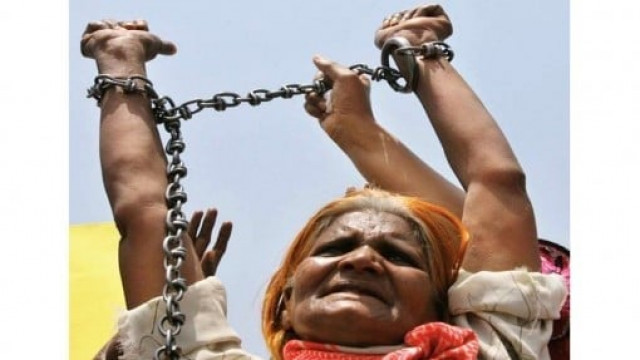With courts on the labourers’ side, the tide turns against landlords
Establishing more anti-bonded labour cells may be the only way to ensure justice.

According to the Code of Criminal Procedure’s (CrPC) Section 491, courts can free people “detained illegally or improperly in public or private custody,” without any investigations.
“This law is quick relief for freedom,” said Advocate Naseer Laghari, who has appeared in many cases as a counsel for bonded labourers. “Nevertheless, the people who enslave are not punished in almost all cases.”
Landowners say the ‘quick relief for freedom’ works against them. “What type of justice is this in which a respondent is neither heard nor punished?” asked Abdul Majeed Nizamani, an agricultural expert and president of the Sindh Abadgar Board.
Nizamani complains that the code of criminal procedure is misused. “I appeal to the Chief Justice of Pakistan to take notice of cases where chained labourers claim to be rescued from private jails. If there is any truth to the story, those whose captivity they are recovered from should also be punished,” he said.
In Nizamani’s opinion, it’s the landlords who suffer. “Landowners are accused of enslaving people, while they actually lose money that they give to haris (landless sharecroppers) on credit,” he said.
Debt payment
According to the Bonded Labour System (Abolition) Act 1992 and Rules 1995, labourers are not liable to repay debt since the “bonded labour system means the system of forced or partly forced labour under which a debtor enters into an agreement with the creditor.”
The prevalence of the centuries-old practice of sharecropping and making advanced payments to peasants is the source of the problem, landowners say.
“If a family working on my land urgently needs money in case of an accident, will I be able to refuse them?” said Talat Mehmood Arain from whose land peasants were recently freed. Blaming NGOs and workers of political parties for inciting peasants, he said courts allow landowners to be robbed, while “portraying the person robbed as guilty.”
Small landowners like Amir Ghulam Nabi share the same opinion. “I have been duped four times in three years by peasants who took my money and ‘liberated themselves’,” he said. Nabi is now thinking of switching businesses.
However, labourers complain that are not given an adequate profit for their hard work. “Neither were we given our just share, nor were we allowed to work for another landowner,” said Meeran, who was freed from bondage after court orders in 2002.
Anti-bonded labour cells
As an alternative system to seeking justice from the courts, anti-bonded labour cells have been set up. However, there are only two in Sindh, with one in Mirpurkhas and another in Hyderabad.
Landowners are more satisfied with this system. The cells investigate cases and if bondage is established they file an FIR under the 1992 Act, which includes up to five years imprisonment.
“They can also work for the relief of a landlord implicated in a spurious complaint,” said Kashif Bajeer from the Society for Protection of the Rights of the Child (Sparc). Bajeer played a pivotal role in setting up the cells. “Sparc’s stance is to discourage the application of CrPC 491 as it does not give complete relief to either the labourer or the employer.” Bajeer also acknowledged that sensitisation of the judges against the use of CPC 491 is necessary.
District vigilance committees
Seventeen-member district vigilance committees were also meant to be set up under the 1992 Act to monitor bondage in a district. However, the committees have not really been activated in many areas, and in places where they exist, they have not been able to effectively monitor or curb bonded labour.
“It’s a pity that 19 years after the law was enacted, the committees are yet to be activated,” Bajeer said, adding that the committees can prevent innocent landowners or employers from “rough justice”.
Published in The Express Tribune, January 9th, 2012.


















COMMENTS
Comments are moderated and generally will be posted if they are on-topic and not abusive.
For more information, please see our Comments FAQ